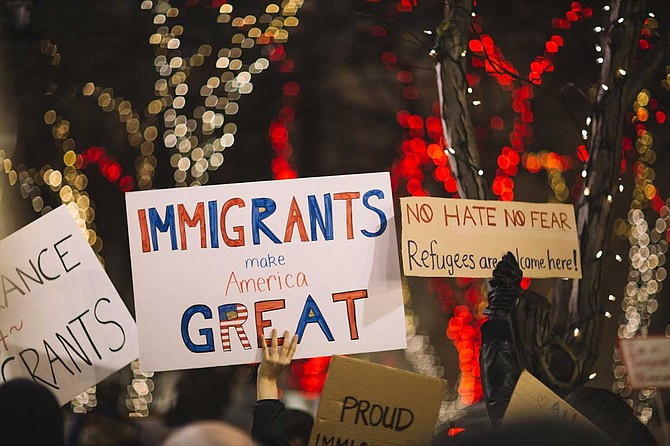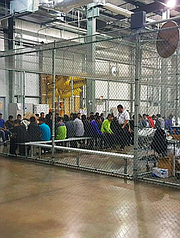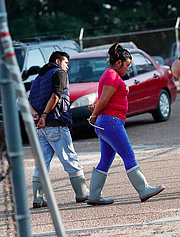"Perhaps most importantly, we can set an example of what America really is. We can use our own voices to call for a humane immigration system and use our resources to support members of our communities who were attacked today. We can be the America we know we can be." Photo by Nitish Meena on Unsplash
Yesterday, children across Mississippi went to their first week of school, many for the first time. Hard-working men and women went to work at their jobs in factories and offices across the state. It seemed like a day like any other. It wasn't.
When the black-clad immigration officers panned out around Mississippi Wednesday, the lives of many innocent men, women and children were changed forever. Immigration and Customs Enforcement agents conducted raids in communities across the state including Canton, Forest, Morton, Sebastopol, Carthage, Pelahatchie and Bay Springs. Altogether, they arrested 680 people in what became the largest single-state immigration raid in American history.
No matter what the current occupant of the White House says, these people were not "animals." They were not an "invasion." And they were not an "infestation." No. They were simply people who had come to America searching for a better life. They were doing nothing but working their jobs. For this, they were ripped away from their families and their communities.
Now, many of those arrested will go to an immigration detention camp in Jena, Louisiana. Camps like this are often overcrowded, unsanitary and inhumane. In these places, immigrants are regularly made to sleep on hard concrete floors and denied basic needs like soap and toothpaste.
How did we get here? How did the nation who once proudly welcomed the world's tired, poor and huddled masses yearning to be free become the nation that snatches people from their communities to put them in camps?
Racist History of U.S. Border Laws
It started back in 1929. Before that, crossing the border without authorization was a civil matter. But, in 1929, U.S. Senator Coleman Livingston Blease proposed an idea that would fundamentally change America. Like many others, Sen. Blease was a virulent white supremacist who especially loathed Mexican refugees. To further his racist ideology, Blease proposed criminalizing unauthorized border crossings.
The Immigration Debate in Mississippi
Ongoing coverage of the politics and treatment of immigrants and refugees in Mississippi
His law, codified as Section 1325, is the foundation of America's modern immigration system. In 2005, President George Bush ushered in the modern era of mass deportations with his "Operation Streamline" program to prosecute as many unauthorized immigrants as rapidly as possible. Working together, Section 1325 and Operation Streamline established the first iteration of America's "zero-tolerance" policy toward unauthorized border crossings, quadrupled the number of prosecutions and dramatically increased the number of deportations.
President Barack Obama continued this program and reached the peak of immigration prosecutions in 2013 with 97,000 prosecutions in one year. In truth, the current administration's immigration policy is just the latest and most cruel chapter in this dark history. Modern border agents may be more uninhibited and may openly say they are using fear to deter immigration, but America's policy toward Mexican immigration has always been founded on racism and xenophobia. What we saw yesterday is heartbreaking, but it should not be surprising.
This is a dark time. Every day, unauthorized immigrants live in fear of deportation. For years now, these neighbors of ours have been under attack by a president who demonizes them as the "other." And, just this past week, immigrants in El Paso came under lethal attack by a domestic terrorist inspired by this climate of hate.
Still, in the darkness, there is light. I believe we can use this time and these events as a turning point. Like Paul on the Road to Damascus, we can let the scales fall off our eyes so that we can see our immigration policy for what it really is. Then, we can get to work.
What We Can Do Now
So what do we do now? Now that this history has hit so close to the heart of our state, what should we do to fight back?
While we should certainly support movements for structural change like those to abolish ICE (and its counterpart Customs and Border Patrol) and repeal Section 1325, there are actions we can take on the local level right now.
We can encourage our churches and places of worship to heed Jackson Mayor Chokwe Lumumba's call to create sanctuary spaces for immigrant families. Those of us who are religious can use this opportunity to put our faith into action.
How to Help Children, Families After Mississippi ICE Raids
A growing collection of many ways to help and donate in the wake of the Mississippi ICE raids.
We can lobby our local governments to follow the lead of cities taking bold action to protect immigrants. Chicago has established a local ID card program that gives immigrants access to basic services like public libraries and transportation. Cities from Nashville to Houston have established offices specifically for the purpose of welcoming and helping new Americans. Mississippi cities can fight for immigrants, too.
We can work to elect local and state candidates who will fight for immigrant rights and oppose those who use xenophobia as a political tactic. We can show those who seek to divide us that hate will not prevail in our Mississippi.
We can support local organizations like the Mississippi Immigrants Rights Alliance and the Mississippi branch of the MacArthur Justice Center that battle for immigrants in court. At the very least, immigrants should be guaranteed due process and a day in court.
Perhaps most importantly, we can set an example of what America really is. We can use our own voices to call for a humane immigration system and use our resources to support members of our communities who were attacked today.
We can be the America we know we can be.
Jay Kucia is a third-year law student at the University of Mississippi. After graduating in May 2020, Jay plans to work in Jackson, his hometown, as a civil rights attorney.
More like this story
- Advocates: In Mississippi, ICE Agents Arrest, Tase Migrants, Documented or Not
- Elected Officials, Advocacy Groups, Others Address Mississippi ICE Raids
- Mississippians Mobilize Against ICE Raids: 'Who They Gone Come After Tomorrow?'
- Beto O'Rourke: Trump Used ICE to 'Terrorize' Mississippi Hispanics
- U.S. Attorney in Mississippi to 'Aliens,' Employers: 'We're Coming After You'






Comments
Use the comment form below to begin a discussion about this content.